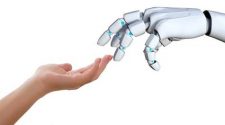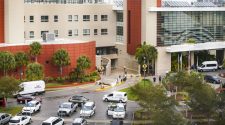The University of Strathclyde has signed a licensing deal for pioneering light technology which kills pathogenic bacteria linked to hospital acquired infections.
Italian light manufacturer Linea Light Group is the first European-based licensee of High Intensity Narrow Spectrum (HINS) light technology, which can suppress harmful bacteria in the air and on surfaces using a narrow spectrum of visible light.
The innovative technology was developed at the University of Strathclyde by Professor Scott MacGregor, Professor John G Anderson, Dr Michelle Maclean and Professor Gerry Woolsey.
The light-based disinfection method operates at a wavelength where it can be run safely in the presence of humans and has been trialled and deployed as a ceiling mounted light source.
Decontamination technology
Linea Light Group, which has an 85-strong research and development department, combines HINS-light decontamination technology with the light of its professional products, creating the new ‘Environment Care Lighting’ for use across hospitals and other health facilities, public areas, schools, offices and breeding farms, as well as for hospitality and residential use.
Developed in the University’s state-of-the-art Robertson Trust Laboratory for Electronic Sterilisation Technologies (ROLEST), clinical trials in hospitals demonstrated that HINS provides significantly greater reductions of bacterial pathogens in the environment than can be achieved by cleaning and disinfection alone. The discovery signalled a huge step forward in hospitals’ ability to prevent the spread of infection and it was developed for commercialisation around 10 years ago.
Professor MacGregor, who is Vice-Principal of the University of Strathclyde and leader of the research team said: “The HINS-light technology is a great example of how the University of Strathclyde produces innovation which also benefits society.
The technology is harmless to people so can be used continuously in occupied patient rooms and environments, thereby enhancing disinfection and preventing the spread of infection. Our agreement with Linea Light Group means that many more people in healthcare and commercial environments can benefit from the technology.”
Gianluca Salciccia, Linea Light Group’s Sales Director, said: ” Linea Light Group’s approach to luminaire design has always been unconventional, and we have a new way of thinking about the product that allows our Research & Development team the freedom to be creative.
“Lighting technology can be an important tool for wellbeing and improving people’s quality of life. Linea Light Group’s new Environment Care Lighting could also add a third dimension of physical wellbeing, with products capable of decontaminating the environments in which people live and work, protecting their health”.
Strathclyde’s Research & Knowledge Exchange Services and IP & Commercialisation team supported the research team with the protection of intellectual property and dedicated commercialisation resources leading to the agreement with Linea Light Group.















